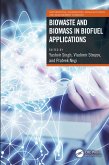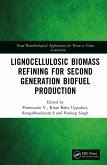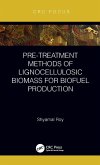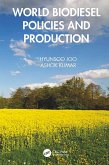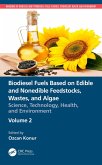Biowaste and Biomass in Biofuel Applications (eBook, ePUB)
Redaktion: Singh, Yashvir; Negi, Prateek; Strezov, Vladimir
50,95 €
50,95 €
inkl. MwSt.
Sofort per Download lieferbar

25 °P sammeln
50,95 €
Als Download kaufen

50,95 €
inkl. MwSt.
Sofort per Download lieferbar

25 °P sammeln
Jetzt verschenken
Alle Infos zum eBook verschenken
50,95 €
inkl. MwSt.
Sofort per Download lieferbar
Alle Infos zum eBook verschenken

25 °P sammeln
Biowaste and Biomass in Biofuel Applications (eBook, ePUB)
Redaktion: Singh, Yashvir; Negi, Prateek; Strezov, Vladimir
- Format: ePub
- Merkliste
- Auf die Merkliste
- Bewerten Bewerten
- Teilen
- Produkt teilen
- Produkterinnerung
- Produkterinnerung

Bitte loggen Sie sich zunächst in Ihr Kundenkonto ein oder registrieren Sie sich bei
bücher.de, um das eBook-Abo tolino select nutzen zu können.
Hier können Sie sich einloggen
Hier können Sie sich einloggen
Sie sind bereits eingeloggt. Klicken Sie auf 2. tolino select Abo, um fortzufahren.

Bitte loggen Sie sich zunächst in Ihr Kundenkonto ein oder registrieren Sie sich bei bücher.de, um das eBook-Abo tolino select nutzen zu können.
This book reflects the new dimension of biofuel production from its introductory principles to the advancements in future prospective. It summarizes the rationale for changes in liquid fuel utilization and selection of new technologies with an aim to make biofuel cost-effective to move towards a carbon-neutral approach.
- Geräte: eReader
- mit Kopierschutz
- eBook Hilfe
Andere Kunden interessierten sich auch für
![Biowaste and Biomass in Biofuel Applications (eBook, PDF) Biowaste and Biomass in Biofuel Applications (eBook, PDF)]() Biowaste and Biomass in Biofuel Applications (eBook, PDF)50,95 €
Biowaste and Biomass in Biofuel Applications (eBook, PDF)50,95 €![Lignocellulosic Biomass Refining for Second Generation Biofuel Production (eBook, ePUB) Lignocellulosic Biomass Refining for Second Generation Biofuel Production (eBook, ePUB)]() Lignocellulosic Biomass Refining for Second Generation Biofuel Production (eBook, ePUB)49,95 €
Lignocellulosic Biomass Refining for Second Generation Biofuel Production (eBook, ePUB)49,95 €![Biogas Technology in Nigeria (eBook, ePUB) Biogas Technology in Nigeria (eBook, ePUB)]() Isaac Nathaniel ItodoBiogas Technology in Nigeria (eBook, ePUB)21,95 €
Isaac Nathaniel ItodoBiogas Technology in Nigeria (eBook, ePUB)21,95 €![Pre-treatment Methods of Lignocellulosic Biomass for Biofuel Production (eBook, ePUB) Pre-treatment Methods of Lignocellulosic Biomass for Biofuel Production (eBook, ePUB)]() Shyamal RoyPre-treatment Methods of Lignocellulosic Biomass for Biofuel Production (eBook, ePUB)23,95 €
Shyamal RoyPre-treatment Methods of Lignocellulosic Biomass for Biofuel Production (eBook, ePUB)23,95 €![World Biodiesel Policies and Production (eBook, ePUB) World Biodiesel Policies and Production (eBook, ePUB)]() World Biodiesel Policies and Production (eBook, ePUB)54,95 €
World Biodiesel Policies and Production (eBook, ePUB)54,95 €![Utilization of Waste Biomass in Energy, Environment and Catalysis (eBook, ePUB) Utilization of Waste Biomass in Energy, Environment and Catalysis (eBook, ePUB)]() Utilization of Waste Biomass in Energy, Environment and Catalysis (eBook, ePUB)48,95 €
Utilization of Waste Biomass in Energy, Environment and Catalysis (eBook, ePUB)48,95 €![Biodiesel Fuels Based on Edible and Nonedible Feedstocks, Wastes, and Algae (eBook, ePUB) Biodiesel Fuels Based on Edible and Nonedible Feedstocks, Wastes, and Algae (eBook, ePUB)]() Biodiesel Fuels Based on Edible and Nonedible Feedstocks, Wastes, and Algae (eBook, ePUB)52,95 €
Biodiesel Fuels Based on Edible and Nonedible Feedstocks, Wastes, and Algae (eBook, ePUB)52,95 €-
-
-
This book reflects the new dimension of biofuel production from its introductory principles to the advancements in future prospective. It summarizes the rationale for changes in liquid fuel utilization and selection of new technologies with an aim to make biofuel cost-effective to move towards a carbon-neutral approach.
Dieser Download kann aus rechtlichen Gründen nur mit Rechnungsadresse in A, B, BG, CY, CZ, D, DK, EW, E, FIN, F, GR, HR, H, IRL, I, LT, L, LR, M, NL, PL, P, R, S, SLO, SK ausgeliefert werden.
Produktdetails
- Produktdetails
- Verlag: Taylor & Francis eBooks
- Seitenzahl: 312
- Erscheinungstermin: 27. Februar 2023
- Englisch
- ISBN-13: 9781000840148
- Artikelnr.: 67249226
- Verlag: Taylor & Francis eBooks
- Seitenzahl: 312
- Erscheinungstermin: 27. Februar 2023
- Englisch
- ISBN-13: 9781000840148
- Artikelnr.: 67249226
- Herstellerkennzeichnung Die Herstellerinformationen sind derzeit nicht verfügbar.
Dr. Yashvir Singh is presently working as post-doctoral fellow in Faculty of Mechanical and Manufacturing Engineering, Universiti Tun Hussein Onn Malaysia, Parit Raja, Batu Pahat, Johor, Malaysia. He is also an associate professor in the Department of Mechanical Engineering, Graphic Era Deemed to be University, Dehradun, Uttarakhand, India. He has more than 15 years of teaching experience. He has written more than 100 research articles and published them in various peer-reviewed journals. He is also a reviewer and editorial board member of various journals. His specialization includes areas like tribology, biofuels, lubrication, manufacturing, Additive Manufacturing etc. He has taught various subjects at UG and PG level, such as non-conventional machining processes, advanced manufacturing processes and additive manufacturing. He published various research papers in reputed journals and also reviewed various articles in the journals. Prof. Vladimir Strezov is a professor at the Department of Earth and Environmental Sciences, Faculty of Science and Engineering, Macquarie University, Australia. He holds a Ph.D. degree in chemical engineering and a B.E. degree in mechanical engineering. Before commencing academic work at Macquarie University in 2003, he was a researcher at the Department of Chemical Engineering, the University of Newcastle and at BHP Research in Newcastle, Australia. Professor Strezov leads a research group at Macquarie University working on renewable and sustainable energy, industrial ecology, control of environmental pollution, and design of sustainability metrics of industrial operations. Professor Strezov was an advisory panel member for the Australian Renewable Energy Agency (ARENA) (2015-2020). He is a Fellow of the Institution of Engineers Australia and a Fellow of the Australian Institute of Energy. He is an editorial member for the journals Sustainability, Environmental Progress & Sustainable Energy, International Journal of Sustainable Engineering, and International Journal of Chemical Engineering and Applications. He is the author of ~300 publications and editor of four books: Biomass Processing Technologies, with T. J. Evans (2014), Antibiotics and Antibiotics Resistance Genes in Soils, with M. Z. Hashmi and A. Varma (2017), Renewable Energy Systems from Biomass: Efficiency, Innovation, and Sustainability with H.M. Anawar (2019) and Sustainable and Economic Waste Management: Resource Recovery Techniques with H.M. Anawar and Abhilash (2020). Mr. Prateek Negi is presently working as an assistant professor at the Department of Mechanical Engineering, Graphic Era Deemed to be University, Dehradun, Uttarakhand, India. His areas of specialization include thermal energy storage, energy technologies, and alternate fuels, and is currently working on the tribological analysis of bio-lubricants. Being a reviewer of some peer-reviewed journals, he has more than 20 journal and conference papers to his credit. Has taught various subjects at UG level, including heat and mass transfer, thermodynamics, non-conventional energy resources, computer-aided design, and manufacturing and operations research.
Chapter 1. Sustainability of Waste Cooking Oil for the Production of
Biodiesel and Its Tribological Applications: A Review. Chapter 2.
Application of Nanofluids in Solar Desalination Process: A Review. Chapter
3. Nanomaterials as Additives in Biodiesel. Chapter 4. Challenges and
Future Prospects of Biofuel Generations: An Overview. Chapter 5. A
Comparative Study of Physicochemical Properties and Performance
Characteristics of Various Biodiesel Feedstock: An Overview. Chapter 6.
Chemical Processing Techniques Related to Bio-Waste for Their Conversion to
Biofuel. Chapter 7. The Effectiveness of Balanites aegyptiaca Oil Nanofluid
Augmented with Nanoparticles as Cutting Fluids during the Turning Process.
Chapter 8. Lignocellulose Biomass Pyrolysis for Bio-Oil Production: Biomass
Pre-treatment Methods for Production of Drop-In Fuels. Chapter 9.
Thermochemical Production of Bio-Oil: Downstream Processing Technologies
for Bio-Oil Upgrading, Production of Hydrogen, and High Value-Added
Products. Chapter 10. Free Fatty Acids and Their Role in CI Engines
Biodiesel and Its Tribological Applications: A Review. Chapter 2.
Application of Nanofluids in Solar Desalination Process: A Review. Chapter
3. Nanomaterials as Additives in Biodiesel. Chapter 4. Challenges and
Future Prospects of Biofuel Generations: An Overview. Chapter 5. A
Comparative Study of Physicochemical Properties and Performance
Characteristics of Various Biodiesel Feedstock: An Overview. Chapter 6.
Chemical Processing Techniques Related to Bio-Waste for Their Conversion to
Biofuel. Chapter 7. The Effectiveness of Balanites aegyptiaca Oil Nanofluid
Augmented with Nanoparticles as Cutting Fluids during the Turning Process.
Chapter 8. Lignocellulose Biomass Pyrolysis for Bio-Oil Production: Biomass
Pre-treatment Methods for Production of Drop-In Fuels. Chapter 9.
Thermochemical Production of Bio-Oil: Downstream Processing Technologies
for Bio-Oil Upgrading, Production of Hydrogen, and High Value-Added
Products. Chapter 10. Free Fatty Acids and Their Role in CI Engines
Chapter 1. Sustainability of Waste Cooking Oil for the Production of
Biodiesel and Its Tribological Applications: A Review. Chapter 2.
Application of Nanofluids in Solar Desalination Process: A Review. Chapter
3. Nanomaterials as Additives in Biodiesel. Chapter 4. Challenges and
Future Prospects of Biofuel Generations: An Overview. Chapter 5. A
Comparative Study of Physicochemical Properties and Performance
Characteristics of Various Biodiesel Feedstock: An Overview. Chapter 6.
Chemical Processing Techniques Related to Bio-Waste for Their Conversion to
Biofuel. Chapter 7. The Effectiveness of Balanites aegyptiaca Oil Nanofluid
Augmented with Nanoparticles as Cutting Fluids during the Turning Process.
Chapter 8. Lignocellulose Biomass Pyrolysis for Bio-Oil Production: Biomass
Pre-treatment Methods for Production of Drop-In Fuels. Chapter 9.
Thermochemical Production of Bio-Oil: Downstream Processing Technologies
for Bio-Oil Upgrading, Production of Hydrogen, and High Value-Added
Products. Chapter 10. Free Fatty Acids and Their Role in CI Engines
Biodiesel and Its Tribological Applications: A Review. Chapter 2.
Application of Nanofluids in Solar Desalination Process: A Review. Chapter
3. Nanomaterials as Additives in Biodiesel. Chapter 4. Challenges and
Future Prospects of Biofuel Generations: An Overview. Chapter 5. A
Comparative Study of Physicochemical Properties and Performance
Characteristics of Various Biodiesel Feedstock: An Overview. Chapter 6.
Chemical Processing Techniques Related to Bio-Waste for Their Conversion to
Biofuel. Chapter 7. The Effectiveness of Balanites aegyptiaca Oil Nanofluid
Augmented with Nanoparticles as Cutting Fluids during the Turning Process.
Chapter 8. Lignocellulose Biomass Pyrolysis for Bio-Oil Production: Biomass
Pre-treatment Methods for Production of Drop-In Fuels. Chapter 9.
Thermochemical Production of Bio-Oil: Downstream Processing Technologies
for Bio-Oil Upgrading, Production of Hydrogen, and High Value-Added
Products. Chapter 10. Free Fatty Acids and Their Role in CI Engines

